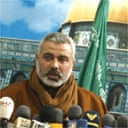Hamas is urging Britain to back its proposal for a ceasefire of up to 10 years as a way of breaking the impasse over its refusal to recognise the state of Israel.
The most senior delegation from the Hamas government to visit Britain is in London this week to promote its offer to allow a period of "co-existence" with Israel as a way to move to an eventual settlement of the Middle East conflict.
The two-man delegation, representing the Palestinian government, is also urging the British government to lift its ban on contact with Hamas.
"We would welcome talks with Tony Blair," said Ahmad Yousef, senior adviser to the Palestinian prime minister, Ismail Haniyeh, in an interview with the Guardian. "We would like to work with him and work with his government to help end the Israeli occupation. We're sending a message to the British government - we're offering a hudna [ceasefire] for 10 years in return for the end of occupation." Hamas wants European governments to accept its ceasefire plan in lieu of the Islamist group formally recognising Israel.
"We hope the Europeans will become aware of the concept of hudna, and that it can become a substitute for recognition of Israel," said Mr Yousef.
"Debate about a political nation's right to exist seems infantile. Israel is a state now, it is part of the UN, it is de facto there, and we deal with it every day."
The Quartet - the US, EU, UN and Russia - have demanded that Hamas formally recognise Israel, renounce violence, and accept previous agreements between Israel and the Palestine Liberation Organisation, before the Quartet lifts the economic embargo on the West Bank and Gaza imposed after Hamas won elections in January.
Mr Yousef said that there was no support in Gaza and the West Bank for recognition of Israel, and he could not propose such a change at present.
"If I did, I would end up like Michael Collins," he said, referring to the Irish republican leader assassinated in 1922 for accepting an Irish two-state solution.
"We need to change people's minds on how they look at the conflict, and it will take time. The climate will change if we have a period of peace."
Mr Yousef and Said Abu Musameh, a former Hamas leader and now a member of the Palestinian national assembly, said the ceasefire proposal, first put forward a decade ago by the late Hamas leader, Sheikh Ahmed Yassin, would be a de facto recognition of Israel. A period of peace could create the environment for later negotiations on a full Middle East peace deal.
Mr Yousef was pessimistic about the prospect of serious talks with Israel about a peace deal in the next two years, saying such talks would have to await the replacement of the Bush administration with a government that would put pressure on Israel. Israel will reject any such ceasefire proposal unless accompanied by formal recognition. Hamas is planning a conference in Doha, Qatar, next month to discuss the plan with leaders from other Arab and Muslim countries.
The Foreign Office yesterday ruled out any meetings with the Hamas delegation, despite helping to arrange the visas which allowed them to visit the UK. A Foreign Office spokesman said: "They are in the UK to attend a private conference, and it will not be attended by anyone from the government. Our policy has not changed."
Meanwhile, it emerged that Mr Blair has begun a diplomatic move to test whether Syria is serious about playing a constructive role in the Middle East peace negotiations. He has sent Sir Nigel Sheinwald, his most senior foreign policy adviser, to Damascus where he met Bashar al-Assad, the president.
Downing Street said the move was not a change of policy by the UK towards Syria, but it is the most high-level encounter between the countries since the Iraq war in 2003.
Backstory
The idea of a hudna (truce), to resolve the Israel-Palestinian conflict has been around for a decade but became more prominent after the present intifada began in 2000. The Hamas leader, the late Sheikh Ahmed Yassin, who was sending suicide bombers into Israel, refused to recognise Israel but would offer a ceasefire. Israel rejected this because Hamas still wanted to destroy Israel. In 2003, militias imposed a unilateral but temporary ceasefire. Islamic Jihad broke ranks last year and fired rockets. Hamas has fired rockets but not sent in the suicide bombers.
